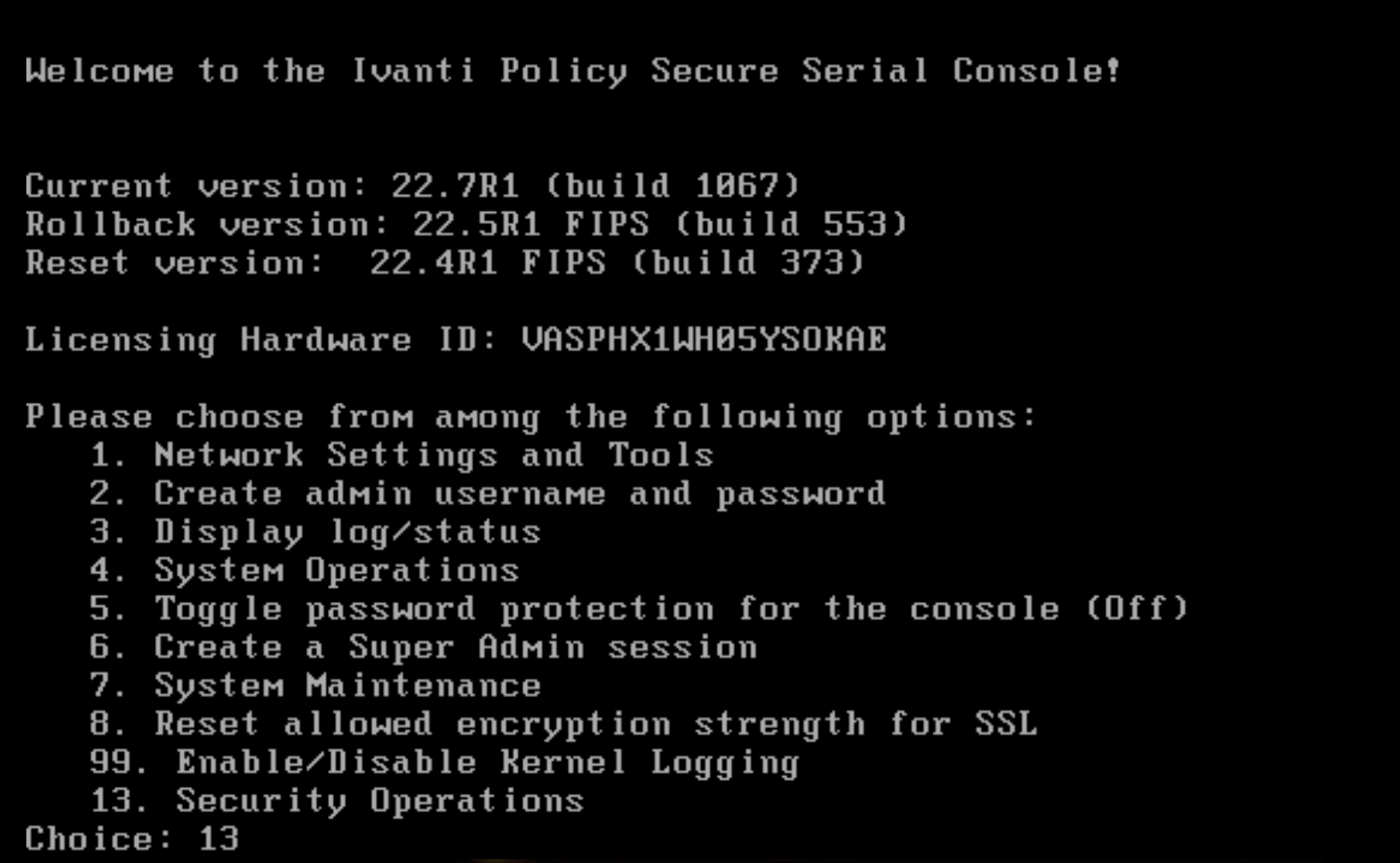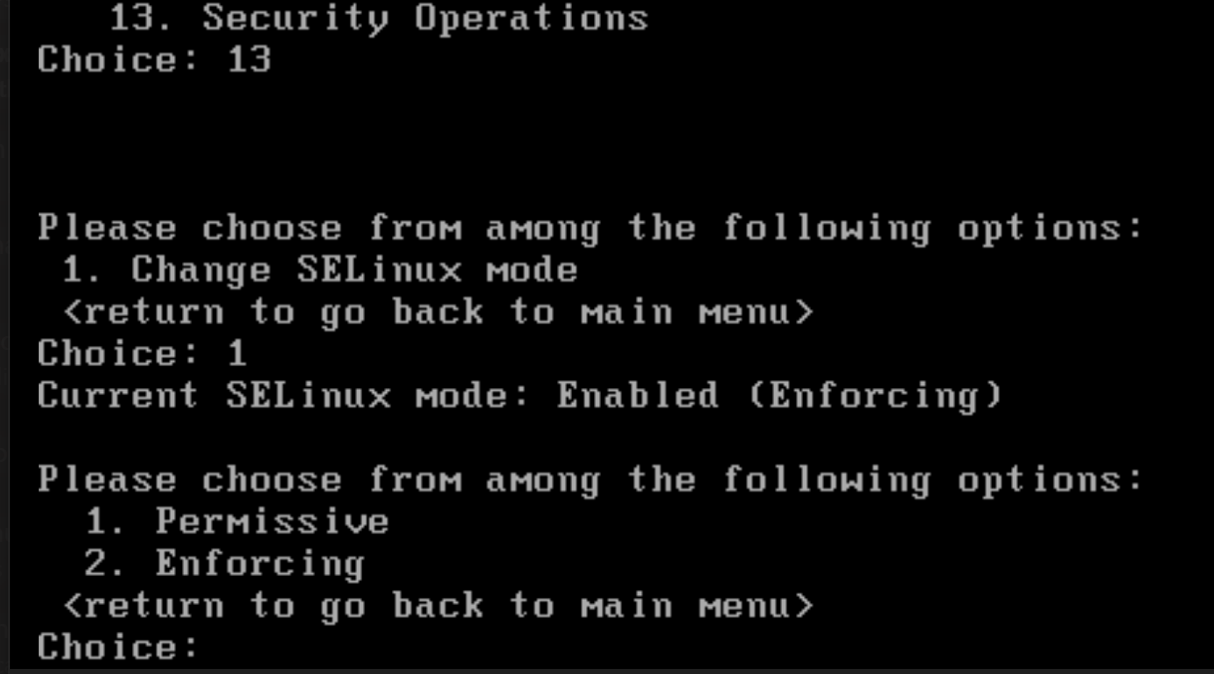Security Hardening
Security Enhanced (SELinux) Support
This feature constraints access to the IPS Linux system (IPS Linux applications) with the minimal set of resources they need.
-
In the serial console, enter 13 to select Security Operations(SElinux).

-
Choose the SELinux mode: This feature is enabled by default with system running in enforcing mode. To change the mode enter 1 and choose the following options:
•Permissive: SELinux logs each system call, but does not filter access requests.
•Enforcing: As each system call is received, SELinux logs it and filters it according to the security policies configured. Security policies determine whether access is allowed or denied by SELinux.
SE Linux cannot be disabled.
Audit Logs
A snapshot of the system state captures details that can help Support Center diagnose system performance problems. The system stores up to ten snapshots, which are packaged into an encrypted "dump" file that you can download and then e-mail to Global Support Center.
To enable Audit Logs:
-
Select Maintenance > Troubleshooting > System Snapshot to display the configuration page.
-
Click the checkbox Include Audit Log under System snapshot options.

Enable SELinux Audit Logs
SELinux audit logs can be very useful for finding out security attacks via SELinux denials and also for debugging purpose.
Sample SELinux denial message
type=AVC msg=audit(1223024155.684:49): avc: denied { getattr } for pid=2000 comm="httpd" path="/var/www/html/file1" dev=dm-0 ino=399185 scontext=unconfined_u:system_r:httpd_t:s0 tcontext=system_u:object_r:samba_share_t:s0 tclass=file
TLS 1.3 Support
To enable TLS 1.3:
-
Select the checkbox Enable TLS 1.3, under Inbound Settings Allowed SSL and TLS Version
TLS for certAuth would be TLS 1.2 even if TLS 1.3 is selected by admin. Note that connection between server and client still would be TLS 1.3. TLS 1.2 is only used for inner TLS (To send as payload in TLS 1.3 packets).
-
While enforcing TLS 1.3 the following Confirm Cipher Change message is displayed.
 Older clients will fail to establish the session when TLS1.3 is enabled for Inbound SSL options. For more details, refer to Impact on Client Launches.
Older clients will fail to establish the session when TLS1.3 is enabled for Inbound SSL options. For more details, refer to Impact on Client Launches.
Browser based Client certificate authentication may not work with all browsers with TLS 1.3 enabled. For more details, refer to Impact on Browser based Cert Auth. -
On selecting Accept only TLS 1.3 option, only TLS1.3 version and its related ciphers are enabled while other versions and their related cipher suites are rejected.

Release 22.7R1 and later does not support weak ciphers and the following list of ciphers are removed:
•TLS_ECDH_RSA_WITH_AES_128_GCM_SHA256
•TLS_ECDH_ECDSA_WITH_AES_128_GCM_SHA256
•TLS_ECDH_RSA_WITH_AES_128_CBC_SHA256
•TLS_ECDH_ECDSA_WITH_AES_128_CBC_SHA256
•TLS_ECDH_RSA_WITH_AES_128_CBC_SHA
•TLS_ECDH_ECDSA_WITH_AES_128_CBC_SHA
•TLS_ECDH_RSA_WITH_AES_256_GCM_SHA384
•TLS_ECDH_ECDSA_WITH_AES_256_GCM_SHA384
•TLS_ECDH_RSA_WITH_AES_256_CBC_SHA384
•TLS_ECDH_ECDSA_WITH_AES_256_CBC_SHA384
•TLS_ECDH_RSA_WITH_AES_256_CBC_SHA
•TLS_ECDH_ECDSA_WITH_AES_256_CBC_SHA
•TLS_ECDHE_ECDSA_WITH_3DES_EDE_CBC_SHA
•TLS_ECDH_RSA_WITH_3DES_EDE_CBC_SHA
•TLS_ECDH_ECDSA_WITH_3DES_EDE_CBC_SHA
•SSL_RSA_WITH_3DES_EDE_CBC_SHA
•TLS_ECDHE_RSA_WITH_3DES_EDE_CBC_SHA
•SSL_RSA_WITH_RC4_128_MD5
•SSL_RSA_WITH_RC4_128_SHA
•TLS_ECDH_ECDSA_WITH_RC4_128_SHA
•TLS_ECDHE_ECDSA_WITH_RC4_128_SHA
•TLS_ECDH_RSA_WITH_RC4_128_SHA
•TLS_ECDHE_RSA_WITH_RC4_128_SHA